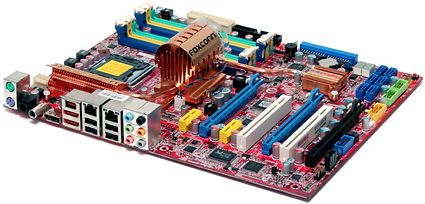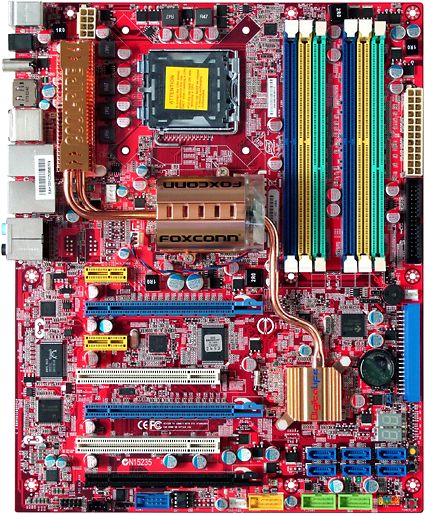X38 Comparison Part 2: DDR3 Motherboards
Foxconn X38A Returns With Improved BIOS
Thanks to its ability to support both DDR2 and DDR3 memory, the previously-reviewed Foxconn X38A makes its return with an improved BIOS to enhance stability and overclocking capabilities. Additional details of the board's layout can be found by following the link above.
Nothing has physically changed with the X38A, but we did receive a better sample - the one we previously used appeared to have minor shipping damage. Primary features include four DDR2 sockets, two DDR3 sockets, and three PCI Express x16 slots. The chipset can only support a choice of either DDR2 or DDR3 memory (with data rates up to the CPU FSB), with the third PCI Express x16 slot featuring x4 pathways.
The new D24 BIOS removes the redundant "Memory Speed" setting, while retaining the memory ratio selection, but the big news is the board's overclocking capability. We were able to reach 502 MHz FSB clock (FSB2008) using 1.60 core volts and the CPU's stock 8x multiplier, for an overclocked CPU speed of 4.02 GHz. The 1.60 V measurement was achieved using the BIOS setting of +0.2875 V.
Dropping the CPU FSB multiplier to 6x allowed a stable 518 MHz FSB clock, but getting any sort of decent overclock was a bit tricky. Rather than increasing the FSB a few megahertz at a time and then testing for stability, we first had to drop the CPU multiplier, raise the FSB, and then increase the multiplier after rebooting. Missed boots often caused the FSB to default to 266 MHz, requiring a BIOS reset to make further changes "stick". This wouldn't be a bad problem if Foxconn had added a method for storing BIOS settings apart from the portion that gets cleared, but the lack of such stored settings made BIOS resets an annoyance.
Further, the BIOS defaulted all of our DDR3 RAM to 1T Command Rate (or 1N, depending on the documentation), making high memory speeds at low latencies difficult to achieve. We were forced to test the "base" 1333 MHz data rate at default 8-8-8-24 latencies, and overclock testing was limited to the use of a 1.2x DRAM multiplier (6:5 DRAM:FSB ratio) at default 6-6-6-15 timings.
Foxconn has come a long way towards making its X38A BIOS overclocker-friendly, but it still has much room for improvement.
Get Tom's Hardware's best news and in-depth reviews, straight to your inbox.
Current page: Foxconn X38A Returns With Improved BIOS
Prev Page BIOS And Overclocking Next Page Gigabyte GA-X38T-DQ6

